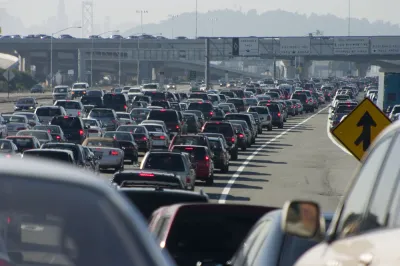Commuting statistics have held consistent, according to Census data, even as the number of people working from home continues to climb.

Changes in the work force mean more people are working from home or telecommuting. "Tech-oriented occupations ideal for working remotely have grown, far exceeding job gains in manufacturing and other industries less conducive to it," Mike Maciag reports for Governing. Telecommuting hasn't translated into fewer people on the roads during rush hour, however. In fact, according to Census data, the percentage of people who commute and the length of their commutes has held steady.
There are many possible explanations for why commutes aren't going away, "A study by the Center for Transportation Studies at the University of Minnesota found telecommuting increased travel for one-worker households, especially for non-work related trips. Other research indicates that when two drivers in a household share a single vehicle, telecommuting merely frees up the vehicle for the other person," Maciag writes. It's also possible that the would-be commuters staying at home have just induced demand, bringing folk who would have used other means to get to work out on to the roads.
FULL STORY: What Does Telecommuting's Rise Mean for Traffic and Transit?

Analysis: Cybertruck Fatality Rate Far Exceeds That of Ford Pinto
The Tesla Cybertruck was recalled seven times last year.

National Parks Layoffs Will Cause Communities to Lose Billions
Thousands of essential park workers were laid off this week, just before the busy spring break season.

Retro-silient?: America’s First “Eco-burb,” The Woodlands Turns 50
A master-planned community north of Houston offers lessons on green infrastructure and resilient design, but falls short of its founder’s lofty affordability and walkability goals.

Test News Post 1
This is a summary

Analysis: Cybertruck Fatality Rate Far Exceeds That of Ford Pinto
The Tesla Cybertruck was recalled seven times last year.

Test News Headline 46
Test for the image on the front page.
Urban Design for Planners 1: Software Tools
This six-course series explores essential urban design concepts using open source software and equips planners with the tools they need to participate fully in the urban design process.
Planning for Universal Design
Learn the tools for implementing Universal Design in planning regulations.
EMC Planning Group, Inc.
Planetizen
Planetizen
Mpact (formerly Rail~Volution)
Great Falls Development Authority, Inc.
HUDs Office of Policy Development and Research
NYU Wagner Graduate School of Public Service




























